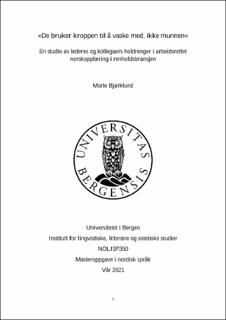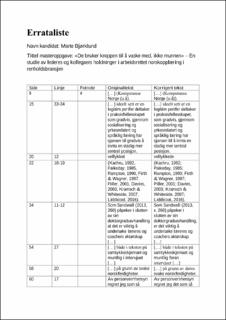| dc.contributor.author | Bjørklund, Marte | |
| dc.date.accessioned | 2021-07-02T06:55:46Z | |
| dc.date.issued | 2021-06-02 | |
| dc.date.submitted | 2021-07-01T22:00:11Z | |
| dc.identifier.uri | https://hdl.handle.net/11250/2762995 | |
| dc.description | Revised version. Minor spelling and formatting errors corrected. | |
| dc.description.abstract | Målet med studien har vært å undersøke lederes og kollegaers holdninger i arbeidsrettet norskopplæring i renholdsbransjen. Studien er designet som tre kasusstudier, der hvert kasus er en arbeidsplass med tre ulike roller: leder, kollega og praktikant, dvs. språkinnlærer, som har fått praksisplass gjennom et kommunalt kvalifiseringsprogram – der språklæring er en del av målet. Datagrunnlaget er hentet gjennom kvalitative intervjuer av de til sammen ni informantene, i tillegg til supplerende observasjoner av praktikant i interaksjon med ledere og kollegaer på de tre forskjellige arbeidsplassene. Alle arbeidsplassene er tilknyttet renholdsbransjen, og er en offentlig barneskole, et privat renholdsfirma og et offentlig sykehjem. Ved hjelp av poststrukturalistisk teori (Norton, 2013; Darvin & Norton, 2015; 2021) søker studien å avdekke hvilke holdninger ledere og kollegaer har til sin egen rolle med tanke på praktikantens språklæring på arbeidsplassen, i hvilken grad arbeidsoppgavene krever språklig interaksjon samt hvilken type språkkompetanse ledere og kollegaer mener en trenger på arbeidsplassen. Sentrale faktorer i analysen er investering, identitet og ideologi. Analysen viser at lederne og kollegaene investerer i praktikantenes språklæring på ulike måter og av ulike grunner. I hvilken grad de velger å gjøre dette synes, uavhengig av hva målet er, i stor grad å avhenge av hvordan de oppfatter praktikantens identitet – samt disses egen investering. Samtlige ledere og kollegaer i studien min legger vekt på at praktikantene bør vise initiativ, stille mange spørsmål og uttrykke engasjement. Dette blir oppfattet som et uttrykk for motivasjon. Denne ekstra forventningen om en bestemt type sosial adferd er ikke nødvendigvis noe praktikantene har oppfattet, fordi ledere og kollegaer synes å oppleve sammenhengen mellom motivasjon og en viss type observerbar adferd som en selvfølge. Praktikanter i studien uttrykker at usikkerhet på egen språkkompetanse samt forsøk på å være høflige, hindrer dem i å utnytte potensielle kommunikasjonsmuligheter, og jeg mener det finnes en fare for at slik taus og forsiktig adferd kan oppfattes som tegn på at praktikanten er lite motivert. Ledere og kollegaer synes mer 156 villige til å investere i språklæringen til praktikanter de oppfatter som motiverte – dvs. individer som viser initiativ og uttrykker engasjement. Samtlige ledere og kollegaer i studien mener at det viktigste er at praktikantene oppfatter instruksjoner relatert til arbeidsoppgavene som skal utføres, og legger dermed vekt på transaksjonell interaksjon. Det samme gjelder praktikantene, som fokuserer på å utføre en best mulig jobb. I tillegg til den viktige transaksjonelle interaksjonen, ønsker kollegaene og lederne at praktikantene skal delta i sosial såkalt pauseprat (jf. relasjonell interaksjon). Samtlige praktikanter synes å dele dette ønsket, men gir uttrykk for at dette er vanskeligere og skumlere enn å oppfatte, og snakke om, de konkrete arbeidsoppgavene. Ledere og kollegaer synes derimot å oppfatte relasjonell tale som mindre krevende enn den jobbrelaterte interaksjonen. Samtlige ledere og kollegaer uttaler at renholdsyrket generelt ikke krever mye språkkompetanse. Jeg mener summen av transaksjonell og relasjonell tale utgjør et høyere forventet språknivå enn lederne og kollegaene nødvendigvis er klar over. Jeg tror spesielt den relasjonelle interaksjonen krever et større bidrag fra målspråksbrukerne. Det er tankevekkende at praktikanter som ikke mestrer pausepraten risikerer å bli oppfattet som uinteresserte og umotiverte – noe vi har sett påvirker lederes og kollegaers vilje til å investere i språklæringen deres. | |
| dc.description.abstract | The purpose of the study has been to explore attitudes among supervisors and colleagues in work-oriented Norwegian language learning in the cleaning industry. The study consists of three different case studies, where each case study is a workplace with three different roles: Supervisor, colleague and intern, i.e. language learner, with an internship through a municipal qualification programme – where language learning is part of the target. The data is collected through qualitative interviews with alltogether nine informants, in addition to supplementive observations of interns in interaction with supervisors and colleagues in three different workplaces. All the workplaces are connected to the cleaning industry: a public Primary school, a private cleaning company, and a public Nursing home. Using poststructuralist theories (Norton, 2013; Darvin & Norton, 2015; 2021), the study aims to uncover attitudes in supervisors and colleagues towards their own participation in developing the interns’ language learning in the workplace. Furthermore, the study addresses to what extent the work task given the interns demand linguistic interaction, as well as which language skills the supervisors and colleagues believe is required at the workplace. Important factors in the analysis are investment, identity, as well as ideology. The analysis shows that supervisors and colleagues invest in the interns’ language learning in different ways, and by different reasons. To what extent they decide to do so appears to depend on, no matter the goal, how they perceive the interns’ identity and investment. All the supervisors and colleagues in my study emphasizes that the interns should show initiative, ask questions, and express engagement. This is perceived as motivation. This additional expectation of a certain social behavior is not necessarily something the interns have made notice of, because the supervisors and colleagues seem to perceive the connection between motivation and certain observable behaviour as a given and self evident. Interns in the study express that their own uncertainty in language skills, as well as courtesy, prevents them from making use of potential communication opportunities. The findings of the present study indicate that this silent and cautious behavior seems to be perceived by the supervisors and colleagues as a sign of lacking motivation. Supervisors and colleagues seem to be more willing to invest in the interns’ language learning if they find them to be motivated, i.e showing initiative and engagement. All the supervisors and colleagues in the study express that the most important thing is that the interns understand the work-related instructions, and by doing so they emphazise transactional interaction. The same goes for the interns, who focus on doing the job as well as possible. In addition to the all-important transactional interaction, colleagues and supervisors want the interns to socialize in lunch breaks and shorter breaks (relational interaction). All the interns appear to share this wish, but they also express that this is more difficult and demanding than understanding and discussing work-related tasks. On the other hand: Supervisors and colleagues seem to perceive relational talk as less demanding than the work-related interaction. All the supervisors and colleagues express that the cleaning industry in general does not require a high level of language skills. I believe the sum of transactional and relational talk contributes to more comprehensive expectations as to language skills than the supervisors and colleagues neccessarily are aware of. My data indicate that relational interaction in particular demands a bigger contribution from supervisors and colleagues, and also that interns struggling with the social interactions in lunch breaks risk being perceived as uninterested and being short of motivation. This effects how willling supervisors and colleagues are in investing in the interns’ language learning. | |
| dc.language.iso | nob | |
| dc.publisher | The University of Bergen | |
| dc.rights | Copyright the Author. All rights reserved | |
| dc.title | «De bruker kroppen til å vaske med, ikke munnen» En studie av lederes og kollegaers holdninger i arbeidsrettet norskopplæring i renholdsbransjen | |
| dc.title.alternative | «They use their bodies for cleaning, not their mouths» A study of supervisors' and colleagues' attitudes in work-oriented Norwegian language learning in the cleaning industry | |
| dc.type | Master thesis | |
| dc.date.updated | 2021-07-01T22:00:11Z | |
| dc.rights.holder | Copyright the Author. All rights reserved | |
| dc.description.degree | Mastergradsoppgave i nordisk språk og litteratur | |
| dc.description.localcode | NOLISP350 | |
| dc.description.localcode | MAHF-NORD | |
| dc.description.localcode | MAHF-LÆNO | |
| dc.subject.nus | 711123 | |
| fs.subjectcode | NOLISP350 | |
| fs.unitcode | 11-21-0 | |

